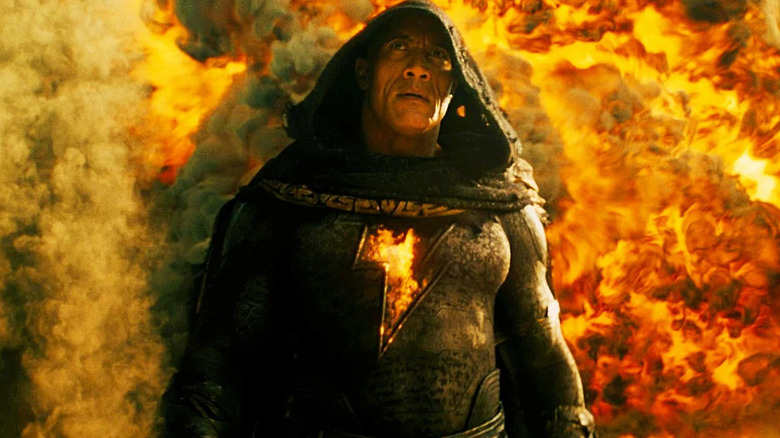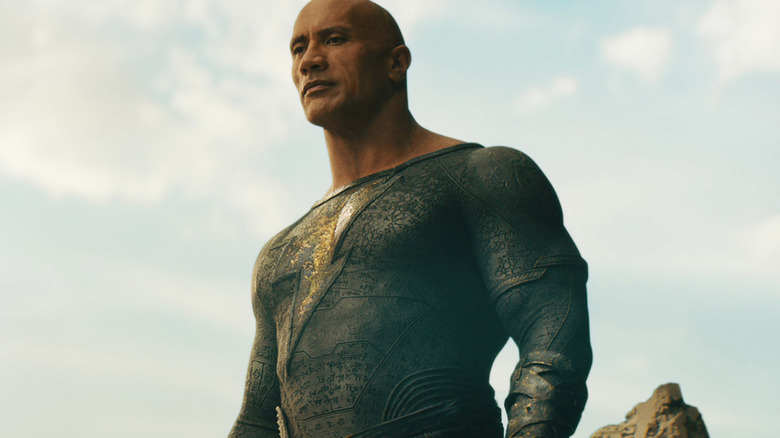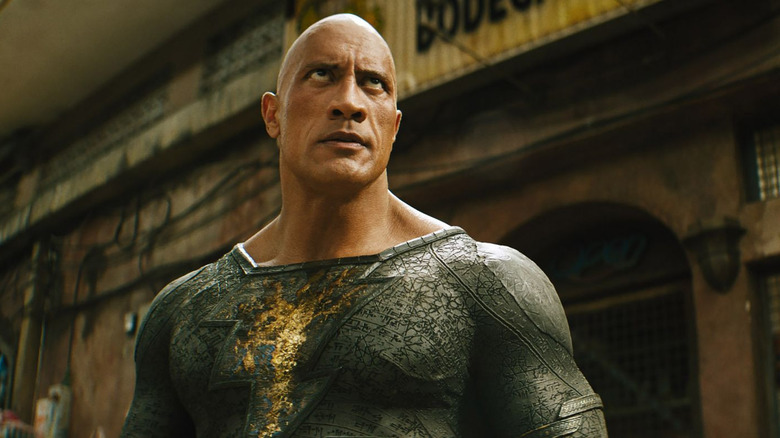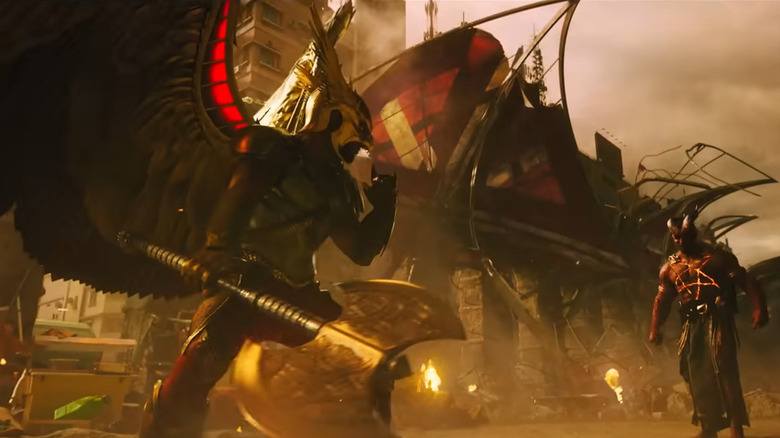Black Adam Makes Us Wonder If Superhero Origin Stories Are Actually Important Anymore
When making a movie about a superhero, there are two approaches a filmmaker can take. One can either tell the story from the beginning, detailing all the complicated circumstances that led to the creation of a Superman, a Batman, or a Morbius. Or one can pick up in medias res, depicting a superhero as already well into their career, their costume chosen, their ethos set. There is, of course, a third option, and that's to tell the story of a superhero's death or retirement, but those stories are painfully rare.
Prior to 2008, superhero movies were less common, and their origin stories were only sometimes covered. Leslie Martinson's 1966 film "Batman" never bothered to explain why Bruce Wayne and Dick Grayson did what they did other than to explain that they supported their local police. Richard Donner's 1978 film "Superman," in contrast, followed Kal-El from his birth on a distant planet, all the way through his youth in Kansas and his adulthood in Metropolis. Tim Burton's 1989 film "Batman" did provide flashbacks to Bruce Wayne's parents being murdered in an alleyway, but the film began with Batman already possessed of a police reputation. Bryan Singer's 2000 film "X-Men" also featured a few flashbacks, but — like the 1960s comics on which it was based — characters no longer needed origins. They merely grew their superpowers themselves.
In 2005, however, Christopher Nolan released "Batman Begins," and that film was popular enough to swivel the entire cinematic genre's focus onto origin stories. Now, not only were origin stories de rigueur, but they also became more practical, detailing the day-by-day events that would lead to a Batman. Within the next decade, audiences saw origins for Iron Man, Thor, Captain America, the Fantastic Four, Ghost Rider, Deadpool, and any number of ancillary Avengers.
Is the universe enough?
One can easily see the need to explain the origins of superheroes. Some of the characters are, after all, strange and unusual and may be unfamiliar to a mass audience. Prior to 2008, Iron Man was something of a C-list Marvel character. After Jon Favreau's feature film, Tony Stark became a central figure in an ever-expanding superhero universe. Once Iron Man established a bedrock, more outlandish characters like Thor could be introduced in his wake. By the time "The Avengers" came out in 2012, four years of prequels and planning made the superhero universe seem palpable. A long series of origin stories led into the origin of their team-up. In terms of practical structure, this was wise. And audiences seemed to respond well.
Additionally, the obsession with origin stories allowed certain TV shows to explore tinier facets of a known character. Shows like "Gotham" and "Smallville" explored superheroes as youths, delving even more deeply into their structured universes, explaining a certain element of fatalism was at play. Of course Batman came into being. All the circumstances of Gotham City's criminal underground demanded it.
It is now 2022. Most of the world's most popular comic book characters have been adapted to screen multiple times over, and filmmakers are exploring relative obscurities like the Eternals, Moon Knight, and Black Adam. And because sprawling, interconnected superhero universes have been a major selling point of the genre for over a decade, each of these characters are now being added to an ever-growing roster of characters that can all interact.
An important question: If there are hundreds of superheroes operating in any given universe, how vital is it to slowly introduce audiences to another?
Surely we can take superheroes for granted
There was a time when the Marvel Cinematic Universe took place in the real world. After 15 years, hundreds of battles, the invasion of space aliens, and the death and resurrection of half the universe, the MCU is now far, far away from anything real. Case in point: "Werewolf by Night" explained that werewolves are just a thing now.
Ditto for the DC Extended Universe, which began dramatically with Superman's near-apocalyptic destruction of a whole city in "Man of Steel" and continued into his very public death and resurrection. Nothing is real any longer. It seems that the characters within the MCU and DCEU certainly don't need explanation of a new vigilante, nor do audiences. It's just a natural part of the genre. Iron Man was right when he argued that superheroes, always increasing in number, need to be regulated somehow. Before long, a measurable percentage of Earth's population will have superpowers.
"Black Adam" gives us a double approach to origin stories. For the title character (Dwayne Johnson), audiences see his life in pre-Babylonian times, the magic of the wizards from "Shazam!," and Black Adam's resurrection into the modern day. The film is about Black Adam learning to use his amazing powers to serve others. It's his origin. In the same film, audiences are hastily introduced to Hawkman (Aldis Hodge), Cyclone (Quintessa Swindell), Atom Smasher (Noah Centineo), and Doctor Fate (Pierce Brosnan). For each of these characters, maybe a single line of dialogue is devoted to their origin. They belong to a team called the Justice Society, and the history of the team is not at all explained.
Black Adam vs. the Justice Society: Origin Story Edition
The question then arises as to which storytelling approach is more appropriate in 2022? After a 15-year-long glut of superhero blockbusters, audiences are well-trained to accept superheroes as a given. We've reached the point where werewolves can merely be, where Justice Societies are already formed, where you don't want to mess with Katana. If a weird-ass character like Hawkman can be thrown in on the side, then clearly a line has long ago been crossed. James Gunn made a movie with Polka-Dot Man, a human shark, and a supervillain who can detach his own arms, and it felt weirdly sedate and normal.
It's going to take an awful lot for anything to feel weird or unexpected in either the MCU or the DCEU.
Why, then, bother with origin stories at all? It seems all that might be needed is a single sentence of exposition and audiences will be ready to roll. One needn't build up to a conflict when the beats are known and the origins are unimportant. Just have the conflict. Drop the pretense that audiences need a slow start. We've been sprinting for a decade. The notion of setting up a grand battle with a single baddie is so 2012.
At this late date, it seems that an origin story would only be necessary if a character's backstory is particularly elaborate. The Eternals are a good example. That's a team of 10 characters whose history dates back 5,000 years, and whose powers find their origins in the hands of a cosmic deity. If, however, one is dealing with a grounded character like Spider-Man or Daredevil, a quick "radioactive spider bite," or "rare chemical spill" is about all an audience requires.



